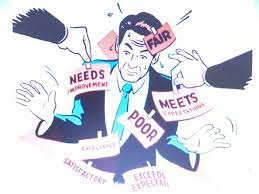Introduction
The yearly performance appraisal. A recurring nightmare for employees and managers alike. A kind of exam fear hangs around the assessment interview. Nobody likes to be criticized. Learn how to prepare with the 4 best ways to survive a performance appraisal.
hangs around the assessment interview. Nobody likes to be criticized. Learn how to prepare with the 4 best ways to survive a performance appraisal.
I will show you how to get rid of this unwanted interview once and for all in my last paragraphs.
Commotion: the annual final report
There are many complaints: about stressed bosses, annoying colleagues, the internet connection that goes out, the ever-poor quality of the coffee.
However, all that suffering is nothing compared to the commotion that appraisal interviews generate: the annual final report is being handed out! The whole ward is overcome with a mild fever. ‘And how was it?’ is questioningly asked. After which an ‘It was ok’ always follows because of course, nobody wants to be inferior to their colleagues.
The strange thing is that most people are usually convinced that they are doing their job well, but from the moment the date and time for ‘the conversation’ are set, they are nevertheless overcome by doubt. Suddenly it is very exciting to hear a final judgment after a year – without exams or interim reports. The stress arises mainly because a report is not simply handed out, but that the matter is ‘discussed’.
 One-sided
One-sided
The latter is not correct, because the assessment interview is a one-way street, you will be explicitly explained. So you sit for at least half an hour listening to your supervisor, who uses a form with boxes and letters to report orally on your ‘strengths and weaknesses. Now, most people love compliments and want to hear what they are doing well. It is the points for improvement that mentally cut in. Why are we so sensitive to that?
Workplace conflicts
Some expert specializes in workplace collisions. A lot of labor disputes are about assessments. Tensions arise when the manager criticizes the employee’s performance. An assessment can hurt a person’s prestige.
An additional problem is often that there is always a difference of opinion between manager and employee. If someone does not function well at work, he will usually attribute it to external causes, illness, or a weak market, for example. A manager will be inclined to look for the cause with the employee himself.
Employees dissatisfied with the conversation
Almost a quarter of employees are dissatisfied with the course of their appraisal interview, according to a recent survey by a consultancy firm. There is a lot of uncertainty about the assessment criteria. One in five employees has no idea what exactly they are being assessed on.
Many people also rarely receive feedback on their daily functioning. Their supervisor saves annoyances and compliments so that the annual appraisal interview degenerates into an eruption of opinions, so-called facts, and vague practical examples, the researchers write.
Image management
The assessments are often not very objective either. Many employees are only assessed by their supervisor, with whom they sometimes have little contact. This leads to the emergence of image management.
It is therefore always wise for employees to showcase successes. Explicitly indicating that you have achieved something. Some men do that to the point of annoyance, but women should show more of what they are doing.
Managers are not half satisfied either
It is not only the employees who have difficulty with the appraisal interview. A recent survey by an employers’ association shows that more than half of the managers are dissatisfied with the appraisal system in their  organization. In practice, they also hardly distinguish between appraisal interviews and performance interviews.
organization. In practice, they also hardly distinguish between appraisal interviews and performance interviews.
A performance interview – for those who are not clear about the distinction either – is intended as a neutral discussion in which employees discuss with their manager how they can develop in their profession, after which all this is put on paper.
Assessment interviews are conducted using forms with established criteria, ranging from measurable performance to behavior at work.
With the help of such a form, a manager can more or less objectively determine someone’s performance. The results are used to direct the employee, to promote or to award a salary increase. Yet many managers continue to find the assessment of performance somewhat vague. Only a quarter of managers use the assessment to determine the salary.
Derogatory assumption: disinterest
The problem with rating systems is that they are based on the assumption that people are not interested in work and that they should be managed in an atmosphere very similar to that of traditional primary school. At least that is how the American consultants Tom Coens and Mary Jenkins describe it, in their book Assessing: does that work?
‘The assumption that we can determine or measure someone’s contribution is derogatory. With assessments, we reduce the work of an individual, which often has heart and soul, from something unique and powerful to a cold and sterile score, which would then supposedly express that person’s total contribution.
‘It is therefore not surprising that so many managers feel uncomfortable conducting appraisal interviews. They rightly feel that there is something wrong with that system,’ say the authors.
Assessment interviews are used by managers to direct their people, but making a judgment is a negative way of leadership. During such an assessment, an employee feels extremely dependent. Moreover, almost everyone experiences criticism of their functioning as personal criticism.
Solutions to the employee
Just as you don’t get a child in line by scaring it, employees will not perform better for fear of a bad assessment. Assessment systems assume that employees must be encouraged to work.
Direction should be given to the employee himself. Most people have the need to show that they are valuable at work, and they also want to know if their supervisor is happy with their performance.
You can’t do without appraisal interviews. It is necessary to have a moment when an employee can see exactly how he is doing. To be able to measure further progress, to be able to make realistic plans for the future, you need such a benchmark.
There is ‘an atmosphere of exam anxiety’ around the assessment interview that must disappear. Employees must be assertive and learn to receive positive and negative criticism. There does not have to be a relationship of dependency either.
Anyone who regularly asks the boss for feedback does not have to fear any surprises during an assessment interview. And should they come unexpectedly, it is quite justified to ask the question: why am I only now being told?
Don’t defend, but ask questions
The best attitude to enter the one-way conversation is: I want to understand what will be told later. Don’t get on the defensive, ask questions. Why does the manager think your performance can be improved at a certain point? Managers, in turn, must be well trained in assessing employees and knowing how to hold the conversation. Things can easily go wrong. Managers can destroy a lot in an appraisal interview. It is important that they explain very carefully how they arrived at their judgment.
No matter how well managers are trained in conducting appraisal interviews, it remains an outdated system, other experts say. It is completely in contradiction with the current trend of holding employees themselves accountable for their development and performance. Instead of those vague appraisal interviews, managers should conduct results interviews with employees.
Results instead of performance
 That’s not a matter of a different naming scheme. In a result interview, the manager acts as a customer and the employee is the supplier. The employee makes a proposal about what he thinks he can deliver and this is recorded. A year later, as a customer and supplier, you will see whether the results are as agreed.
That’s not a matter of a different naming scheme. In a result interview, the manager acts as a customer and the employee is the supplier. The employee makes a proposal about what he thinks he can deliver and this is recorded. A year later, as a customer and supplier, you will see whether the results are as agreed.
Talking about results, rather than performance, is less vague, less personal, and a more equitable form of association that is better suited to current work relationships. For now, however, employees will still have to conduct many traditional appraisal interviews. They are advised to regularly ask for feedback and keep a track record of their performance. It may turn out that you are doing better than you thought.
Is this it?
In short:
1. you will need to understand what is going to be said
2. the manager needs to be trained in these interviews
3. they need to be result-oriented and more than once a year
And if the manager is not trained? Then you can forget about a good interview.
4. The ultimate solution
Why not become your own boss and lose all bosses and performance interviews? Use the internet, have a website, and work from home. You can do so with the world’s best internet business support program. As a member since late 2014, I have prepared a full review of the life-changing opportunity, which you can access by clicking here. You can even become a free member for one week using the link I have given in the review.


Hey there, thanks for your comprehensive and informative article on strategies to deal with a performance appraisal. I’ve gotten nervous when called in for a meeting with my supervisor so this article is super useful. All of these strategies are super actionable and employees and managers alike can keep your tips in mind.
You are welcome and I am happy I could help here. I surely hope to help a lot of others as well.
One of the key points I get out of this post is not to defend but rather ask questions. Yes, I get it that with stress levels high we are inclined to argue and defend. But it’s better to take a deep breath and view it from a healthier angle. Doing this alones, in my book, will constitute a huge progress. Thank you very much!
You make a good point. As in any business conversation, especially the ones with a boss, you should always keep control of yourself. You will lose any battle as soon as you raise your voice, start calling names or show anger in any way.